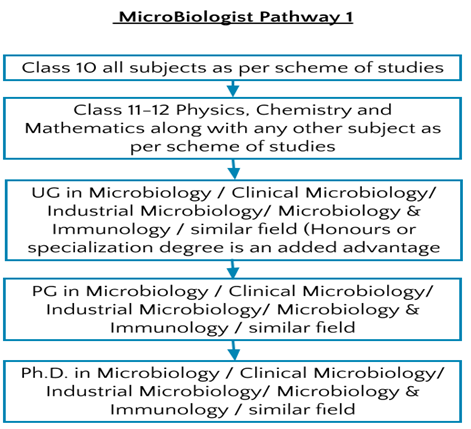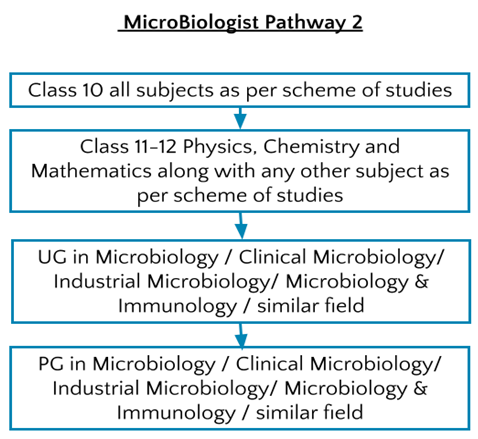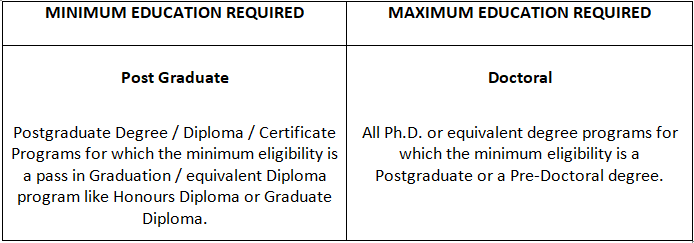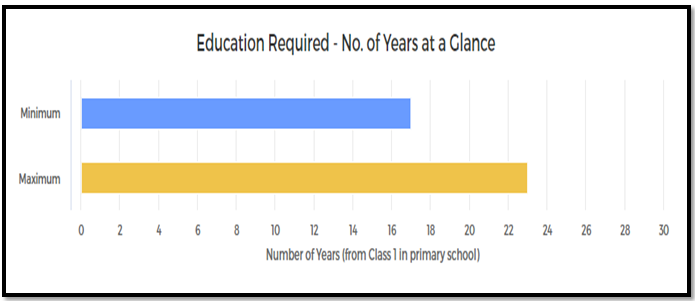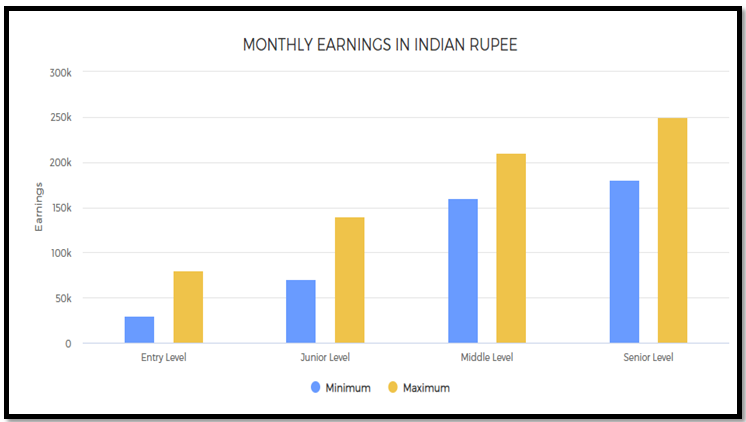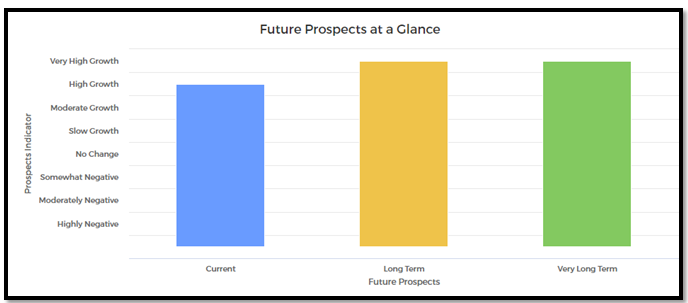Microbiologist
Entry Level Qualification
Graduate
Career Fields
Agriculture & Food Science
For Specially Abled






About Career
Microbiologists are the scientist who study microorganisms. A microorganismisamicroscopic living being described in three categories: unicellular having one cell, multicellular living in cell colonies and a cellular with no cells. Some of the microorganism that microbiologist studies are bacteria, algae, viruses, archaea, fungi, etc. As a microbiologist, you will study their evolution, relationship with humans, animals and plants, taxonomy, etc. You will also study how they cause diseases, environmental changes, etc. Some of these microorganisms are beneficial for industry and agriculture so you will also study them for these interests. You will carry research on microorganism through collecting samples of them studying them under a microscope.
Key roles and responsibilities
As a Microbiologist, depending on your field of specialization, you would have the following roles and responsibilities:
1. You will study the growth, structure, development, and other characteristics of microorganisms including bacteria, virus, fungus, etc. to understand their relationship with other animals and humans or even plants.
2. Using a microscope and other instruments, you will examine physiological, morphological, and cultural characteristics. You will use this information to classify and identify microorganisms present in the human body, water bodies, food and other living beings.
3. You will be available with laboratory services for health departments, health programmes by communities and for a physician who will be needing information for diagnosis and treatment caused by microorganisms. You will perform lab experiments to diagnose and treatment of illness caused by microorganisms.
4. You will research and investigate the relationship between microorganisms and diseases. You will also research on controlling epidemics and effects of medicines of microorganisms.
5. You will keep samples of bacteria, virus, fungus and other microorganisms in a controlled environment for studies.
6. You will work on different complex researches to find the effectiveness of drugs on microorganism and their growth.
7. You will supervise the work of other scientists and evaluate their work.
8. You will monitor the effect of microorganisms on host animals, plants and humans.
9. You will present your research and findings to the world througha research paper, journals, reports, media, news, etc.
PARTICULARS | DESCRIPTION |
Name | Microbiologist |
Purpose | monitor the effect of microorganisms |
Career Field | Mathematics & Science |
Required Entrance Exam | No Entrance Exam |
Average Salary | 300000 - 500000 Rs. Per Year |
Companies For You | Arzeda, Alter, Alpha Biosystems & Many More |
Who is Eligible | Graduate |
Career Entry Pathway
Class 10 all subjects as per scheme of studies– Class 11-12 Physics, Chemistry and Biology along with any other subject as per scheme of studies–– UG in Microbiology / Clinical Microbiology/ Industrial Microbiology/ Microbiology & Immunology / similar field (Honours or specialization degree is an added advantage)– PG in Microbiology / Clinical Microbiology/ Industrial Microbiology/ Microbiology & Immunology / similar field – Ph.D. in Microbiology / Clinical Microbiology/ Industrial Microbiology/ Microbiology & Immunology / similar field
After Class 11-12 Physics, Chemistry and Biology along with any other subject as per scheme of studies, you can study science stream with Physics, Chemistry & Biology in your higher secondary school and then study for an undergraduate science degree in Microbiology / Clinical Microbiology/ Industrial Microbiology/ Microbiology & Immunology / similar field (Honours or specialisation is an advantage) followed by a master’s degree in Science stream in Microbiology / Clinical Microbiology/ Industrial Microbiology/ Microbiology & Immunology / similar field. After a Master’s Degree, you can take a PhD in Microbiology / Clinical Microbiology/ Industrial Microbiology/ Microbiology & Immunology / similar field.
Class 10 all subjects as per scheme of studies– Class 11-12 Physics, Chemistry and Biology along with any other subject as per scheme of studies–– UG in Microbiology / Clinical Microbiology/ Industrial Microbiology/ Microbiology & Immunology / similar field (Honours or specialization degree is an added advantage)– PG in Microbiology / Clinical Microbiology/ Industrial Microbiology/ Microbiology & Immunology / similar field
After Class 11-12 Physics, Chemistry and Biology along with any other subject as per scheme of studies, you can study science stream with Physics, Chemistry & Biology in your higher secondary school and then study for an undergraduate science degree in Microbiology / Clinical Microbiology/ Industrial Microbiology/ Microbiology & Immunology / similar field (Honours or specialisation is an advantage) followed by a master’s degree in Science stream in Microbiology / Clinical Microbiology/ Industrial Microbiology/ Microbiology & Immunology / similar field.
Class 10 all subjects as per scheme of studies– Class 11-12 Physics, Chemistry and Biology along with any other subject as per scheme of studies–– UG in Microbiology / Clinical Microbiology/ Industrial Microbiology/ Microbiology & Immunology / similar field (Honours or specialization degree is an added advantage)– Dual Degree (PG and Ph.D.) in Microbiology / Clinical Microbiology/ Industrial Microbiology/ Microbiology & Immunology / similar field
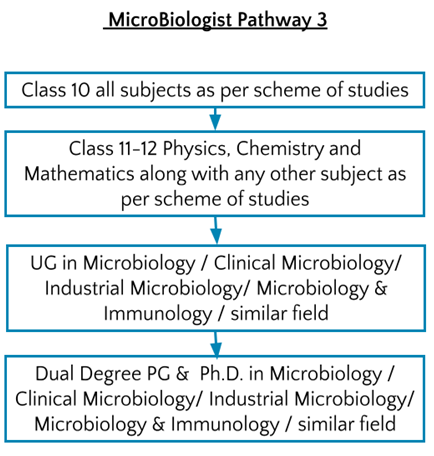
After Class 11-12 Physics, Chemistry and Biology along with any other subject as per scheme of studies, you can study science stream with Physics, Chemistry & Biology in your higher secondary school and then study for an undergraduate science degree in Microbiology / Clinical Microbiology/ Industrial Microbiology/ Microbiology & Immunology / similar field (Honours or specialisation is an advantage) followed by a PG and Ph.D. dual degree in Science stream in Microbiology / Clinical Microbiology/ Industrial Microbiology/ Microbiology & Immunology / similar field.
Required Qualification & Competencies
After your 10+2 with Physics, Chemistry and Biology, you can study for a Bachelor degree in Microbiology / Zoology / Plant Sciences / Botany / in a similar field. Then you should do a Master’s degree with specialisation in any of the following fields:
1. Applied Microbiology
2. Bacteriology
3. Environmental Microbiology
4. Immunology
5. Industrial Microbiology
6. Lichenology
7. Microbial Biotechnology
8. Microbiology
9. Mycology
10. Other Microbial Sciences
11. Phycology
12. Virology
13. Plant Microbiology
Compentencies Required
Interests
1. Investigative: You should have interests for Investigative Occupations. Investigative occupations involve working with ideas and quite a lot of thinking, often abstract or conceptual thinking. These involve learning about facts and figures; involve use of data analysis, assessment of situations, decision making and problem-solving.
2. Realistic: You should have interests for Realistic Occupations. Realistic occupations involve more practical and hands-on activities than paperwork or office work. Realistic occupations often involve physical activities for getting things done using various tools and equipment.
Abilities
1. Abstract Reasoning: The ability to understand ideas which are not expressed in words or numbers; the ability to understand concepts which are not clearly expressed verbally or otherwise.
2. Deductive Reasoning: The ability to apply general rules and common logic to specific problems to produce answers that are logical and make sense. For example, understanding the reasons behind an event or a situation using general rules and common logic.
3. Flexibility of Closure: The ability to identify or detect a pattern (a figure, object, word, or sound) that is hidden among other distracting materials.
4. Inductive Reasoning: The ability to combine pieces of information from various sources, concepts, and theories to form general rules or conclusions. For example, analysing various events or situations to come out with a set of rules or conclusions.
5. Inter-Personal: The ability to build and maintain good relationships with others at workplaces and elsewhere.
6. Naturalistic Intelligence: The ability to recognise different flora and fauna of the world; sensitivity towards nature and natural surrounding; sensitivity towards the needs of different flora and fauna.
7. Verbal Reasoning: The ability to think and reason with words; the ability to reason out ideas expressed in words.
8. Written Comprehension: The ability to read and understand information and ideas presented in writing.
Knowledge
Biological Sciences: Knowledge of plants and animals, their anatomical structure, cell structure, tissues, physiological functions, evolution, and all other related aspects.
Skills
1. Active Learning: Focused and continuous learning from various sources of information, observation and otherwise for application in getting work done.
2. Communication in English: Skills in communicating effectively in writing as well as verbally with others in English language.
3. Coordination: Skills in working together with other people to get things done.
4. Critical Thinking: Skills in analysis of complex situations, using of logic and reasoning to understand the situations and take appropriate actions or make interpretations and inferences.
5. Judgment and Decision Making: Skills in considering pros and cons of various decision alternatives; considering costs and benefits; taking appropriate and suitable decisions.
6. Problem Solving: Skills in analysis and understanding of problems, evaluating various options to solve the problems and using the best option to solve the problems.
7. Reading Comprehension: Skills in understanding written sentences and paragraphs in work related documents.
8. Scientific: Skills in using various scientific rules and methods to get things done or solve problems.
Personality
1. You are somewhat organised in your day-to-day life and activities.
2. You are somewhat careful about your actions and behavior.
3. You are imaginative sometimes.
4. You prefer to experience new things and have new experiences sometimes.
5. You act independently sometimes but do not do so in some other times.
6. You are always practical or in most situations.
Career - Job Opportunities & Profiles
1. Most of the universities and college will hire you as a professor at the position of Junior Professor or Assistant Professor.
2. If you are into research, then you will be hired at the position of research associate. PhD research fellows will be hired as a Junior Research Fellow.
3. Research laboratories and Research Institutes will hire you as a scientist/scientist officer with the lowest grade (Grade C).
4. Many private research bodies, organizations will hire you as a Research Associate.
5. If you are into quality control, then many biopharma companies will here you as a quality controller (Microbiologist).
6. If you are into food processing or dairy industry, you will be hired as a food microbiologist.
You can find job opportunities at the following facilities:
1. Agricultural Research Organizations and institutes.
2. Agriculture, Plant Science, and related colleges and universities.
3. Research centres and laboratories like National Institute of Plant Research Genome.
4. Biopharmaceutical companies like Biocon.
5. Dairy and food production and processing plants like Amul, Mother Dairy, etc.


6. Microbial production companies like Paxchem, etc.
7. Pharmaceutical and biotechnology companies.
Work Environment
As a Microbiologist, you will be mostly involved in research work, quality control, food processing and sample testing. Most of your research will be in the laboratory using a microscope. You will have a regular 8-9 hours job that will require a peer to peer work. If you are working in the food processing or dairy industry, you will be required to do research and testing of food items also. The work will not require you to travel often but still sometimes for data collection, you might have to travel to remote and rural areas too.
Specialisation Tracks In This Career
Bacteriologist
The bacteriologist is the specialist microbiologist who studies the growth, ecology, genetics and biochemistry of bacteria. A microbiologist understands the relation between bacteria and other living beings like plants, animals and humans. As a bacteriologist, you will understand, identify, classify and categorise bacteria. As a bacteriologist, you will also study the effect of bacteria on the environment including health, diseases, etc. Also, you will stud their benefit and usage in industry.
Environmental Microbiology
Microbial ecologist also known as environmental microbiologist studies the ecology (environment) of microorganisms. As an environmental microbiologist, you will study the relationship between microorganisms and their environment. As microorganisms are present everywhere, they have a strong relationship with almost everything and plays a role in many processes. Like many of them are present in the stomach of human for assisting digestion. Some of them are in roots of trees for nitrogen fixation.
Industrial Microbiologist
An industrial microbiologist is a specialize microbiologist who uses microbial science to manufacture industrial products in mass quantities. As an industrial microbiologist, you will use different methods to use microorganisms while increasing industrial products yields. Some of the methods used my industrial microbiologist are introducing mutations into an organism through mutagens. Through these methods industrial products produce are vitamins, antibiotics, solvents, enzymes, amino acids, alcohol, dairy products (like dairy), solvents, etc. These products have any real-world application in daily life.
Lichenologist
Lichenologist is a microbiologist specialist who studies lichens. Lichens are symbiotic organisms’ mode of a symbiotic association of alga and fungus. The symbiotic association is when two organisms live together and rely on each other to survive without harming each other.
Mycologist
Mycologist is a microbiologist who specialises in the study of fungi. As a mycologist, you will study fungi, their genetic and biochemical properties, their taxonomy (naming). You will also study the use of fungi for human as medicine, food, entheogens, etc. You will also research on danger, diseases, toxicity, an infection caused by fungi to humans, domestic animals and agriculture products.
Phycologist
Phycologist is a microbiologist who is a specialist of algae. Algae is an important organises in the aquatic ecosystem. Have you seen the green microorganisms near the water source? That is algae. It is a photosynthetic organism.
Virologist
Virologist is a microbiologist who specialises in the study of viruses. As a virologist, you will study their structure, classification and evolution along with their ways to infect humans, animals and plants. You will also study their reproduction, interaction with host organisms, immunity of host organisms, diseases they cause. Etc. You will also find ways to isolate them and use them for research.
Career Growth
1. Research laboratories will hire you as a scientist/scientist officer with the lowest grade and the grade changes from low to high. In India, grades are “Scientist “C” as the joining level and then D, E, F, G, H, etc. A senior-level scientist can also get into administrative positions like Principal Scientist, Assistant Director, Deputy Director, Director, etc.
2. The career growth in university and college states from Assistant Professor and then Associate Professor, Professor and Professor Emeritus. Professors can also get administrative positions such as Director/Dean/Vice Chancellor, etc.
3. If you are hired as a research associate (JRF and SRF), then you will go on to become a Doctoral Research Fellow, then Post-Doctoral Research Fellow and then Scientist in Progressive Grades.
4. If you are a research associate in private organization, then you will become a scientist and then a senior scientist.
5. If you are into quality control, then from the quality controller (microbiologist), you will become head of quality (microbiologist) and then consultant microbiologist and finally senior consultant microbiologist.
Salary Offered
1. At the entry level, you can join as a research associate with a basic salary of Rs. 25,000 to 30,000. As a doctoral research fellow (junior research fellow) you would be earning around Rs. 35,000 to 38,000 per month. At the entry level, as a Scientist (grade C) you would be earning around Rs. 80,000 to 100,000 per month. As an assistant professor, you would be earning anything between Rs. 65,000 to 70,000 per month. As a scientist in private companies, you will earn anything between Rs. 25,000 to 1, 00,000 per month. As a quality controller microbiologist, you might be earning anything between Rs. 15,000 to 50,000 per month.
2. At the junior level with a work experience of 2-6 years, you would be earning anything between Rs. 50,000 to 1, 40,000 per month.
3. At the middle level with an experience of 10-12 years, you would be earning anything between Rs. 1, 40,000 to 1, 90,000 per month as a scientist and Rs. 1,20,000 to 1,60,000 as a professor. As a quality controller, you might be earning anything between Rs. 40,000 to 1, 00,000 per month.
4. At the senior level of over 15 years of work experience, you would be earning anything between Rs. 1,60,000 to 2,00,000 per month as a professor and Rs. 2,10,000 to 2,50,000 per month as a Scientist. As a quality controller, you might be earning anything between Rs. 60,000 to 2, 00,000 per month.
Monthly Earnings In Indian Rupee
1. Entry level: 0 - 2 years of work experience
2. Junior Level: From 1 to 12 years of work experience
3. Mid-Level: From 5 to 20+ years of work experience
4. Senior Level: From 10 to 25+ years of work experience (there could be exceptions in some high-end technical, financial, engineering, creative, management, sports, and other careers; also in the near future, people will reach these levels much faster in many careers and in some careers, these levels will have no meaning as those careers will be completely tech skill driven such as even now, there is almost no level in a Cyber Security Expert’s job)
Work Activities
1. Analysing and interpreting data and information: Analysis of data and information to find facts, trends, reasons behind situations, etc.; interpretation of data to aid in decision making.
2. Communicating with co-workers and others: Communicating with people in writing, verbally or otherwise inside your workplace and various other people who have professional relationships with your place of work including vendors, government officials, etc. or with people at large.
3. Decision making and problem solving: Analysis of data and information; evaluation of alternative decisions and results of decisions; taking the right decisions and solving problems.
4. Getting Information and learning: Observing, hearing, reading, using computers, or otherwise obtaining information and learning from it.
5. Identifying objects, actions, and events: Identifying various characteristics of objects; observing and understanding actions and events; understanding changes in actions and events.
6. Providing advices and consultation to others: Giving advices or consultation to others about various issues, conceptual matters, know-hows, scientific matters, products or services.
7. Training and teaching: Understanding educational and training needs of others, developing training programs and educational programs, conducting training programs, teaching and instructing others.
8. Updating and using relevant knowledge: Keeping updated with the latest knowledge relevant to your fields of work and use of the relevant knowledge in getting things done.
9. Using computers for work: Using computers for day-to-day office work; using computer software for various applications in day-to-day professional work; entering data and process information; for writing.
10. Working in a team: Working in a team of people; developing team; maintaining professional relationships among team members.
Future Prospects
A microbiologist is in demand in several different kinds of industries. While they are demanded by industries producing microbes, they are also in remand in biopharma companies. The Indian biopharmaceutical industry in on rising for lasts few years. The market for biopharma products is expected to be a USD 40 billion industry in India by 2030. With the growing medical industry, the need and demand for biopharma products and medicines are on the rise too.
Other industries with great prospects for microbiologist are microbial production companies and Dairy and food processing industries. While India is the largest producer of milk; this offers a great opportunity for a microbiologist to work in the dairy industry.
Future Prospects At a Glance


